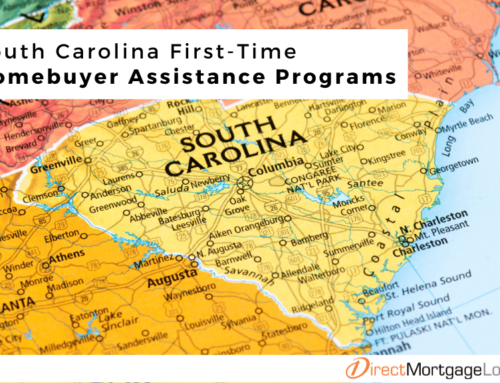Thinking about buying a home? Understanding home loan qualifications is crucial to turning that dream into reality. This guide dives deep into the world of mortgage loan qualification, explaining the key factors lenders consider when evaluating your eligibility for a qualified mortgage.
We’ll break down what you need when qualifying for a mortgage, empowering you to make informed decisions and approach the mortgage process with confidence. By understanding your qualifications, you’ll be well-equipped to navigate loan options, secure the best rates, and ultimately unlock the door to your new home.
Subscribe to our blog to receive notifications of posts that interest you!
What is a mortgage qualification?
If you’re looking to buy a home, you’ll likely need a mortgage. But before you can get approved for a mortgage, you’ll need to go through a process called mortgage qualification.
This process helps lenders determine whether you’re a good candidate for a mortgage, and how much they can lend you. To do this, they’ll look at several factors including your income, your existing debt, your credit score, and the type of property you’re interested in.
The Importance of Qualifying For A Mortgage
Qualifying for a mortgage is an important step which helps lenders minimize the risk of lending money to borrowers who may not have the ability to repay their loan. Generally, borrowers with higher incomes, good credit scores, and low existing debt are considered less risky to lenders.
In addition, qualifying for a mortgage is also beneficial for borrowers as it can help you determine how much money you can afford to pay for a house. This can help you avoid the mistake of falling in love with a home that is outside of your budget.
Mortgage Loan Qualification Factors
When you apply for a mortgage, the lender will assess various factors to decide whether to approve or deny your application. Although the specific criteria may vary depending on the lender and the type of loan you’re applying for, there are some general factors that most lenders will consider. These include:
Income
To ensure your ability to cover your monthly mortgage payments and living expenses, lenders require evidence of a consistent income source. Typically, this involves providing proof of employment, such as pay stubs or W-2s, for the past two years. Keep in mind that different types of income, such as salary, commission, or self-employment income, may have varying requirements.
Debt-to-income Ratio (DTI)
Current debt obligations such as your student loans, car loans, and credit card balances, are also considered when assessing your mortgage eligibility. Your Debt-to-Income Ratio (DTI) is used to compare your total monthly debt payments to your gross monthly income. A lower DTI indicates that a larger portion of your income is available to cover your mortgage payment, which makes you a less risky borrower.
Credit Score
Your credit score serves as a numeric representation of your past borrowing behavior and ability to repay debts. It’s determined by factors like payment history, outstanding balances, new credit, credit history duration, and types of credit used. Therefore, a higher credit score could increase the likelihood of your mortgage application being approved.
Assets
Demonstrating your ability to make payments even during emergencies is crucial for your lender. Providing statements from the past two months for your checking, savings, stock, 401k, and other accounts shows that you possess valuable assets and are financially prepared for unexpected situations.
Type of Property
The type of property you intend to purchase influences the mortgage qualification process. For instance, condo loans may have different requirements compared to single-family home loans due to specific restrictions and regulations. Single-family homes generally offer more flexibility in qualification requirements.
How To Qualify For A Mortgage
The process of qualifying for a mortgage may vary from person to person. This is because it largely depends on several factors such as loan type, financial situation, and the lender. However, here is a basic overview of the steps involved in the qualifying process for a mortgage.
Connect with a Loan Officer
Your first step is to contact a loan officer. We can guide you through the mortgage qualification process step-by-step and answer any questions you may have. During a free consultation, we will discuss your personal financial situation and homeownership goals.
Explore Loan Options
Different loan programs cater to various needs and financial circumstances. Our loan officers can help you explore these options and recommend a program that best suits your situation. Here are just a few of the most common types of mortgages to consider:
FHA Loan
FHA loans are government-insured mortgages which offer flexible guidelines for borrowers who might not qualify for traditional loans due to limited down payment funds or lower credit scores.
Conventional Loan
Conventional loans are a good choice for homebuyers who want more options than government-backed programs can provide. They are not insured by the government; however, they follow standards set by Fannie Mae and Freddie Mac. They provide a wider range of down payment options and greater flexibility in choosing mortgage insurance.
USDA Loan
USDA loans are a government-backed mortgage option for homebuyers looking to purchase in a designated rural area. These loans, guaranteed by the U.S. Department of Agriculture, eliminate the need for a down payment and private mortgage insurance (PMI).
VA Loan
A VA loan is a financing option for eligible service members, veterans, and surviving spouses. These loans are partially backed by the Department of Veterans Affairs and offer flexible terms tailored to veterans’ needs, including zero down payments.
Gather Your Documents
Once you have a good understanding of your loan options, it’s time to gather the necessary documents to verify your financial stability. Having these documents readily available will streamline the application process. These documents typically include:
- Pay stubs (recent)
- Tax returns (past 2 years)
- W-2s (past 2 years)
- Bank statements (recent months)
- Investment account statements (if applicable)
Submit An Application
The next step is to apply. This step requires you to provide your personal information, financial documents, and authorization for a credit check. Your lender will assess your credit score and history, along with your income, assets, and debt-to-income ratio (DTI). This will allow you to see how much you can comfortably afford before you start house hunting.
How much mortgage can I qualify for?
The amount you could qualify for in a mortgage depends on several factors. However, you can get an estimate of how much you could qualify for by using our Home Affordability Calculator.
FAQ’s About Qualifying For A Mortgage Loan
Can I use rental income to qualify for a mortgage?
When purchasing an investment property or converting your current home into a rental, lenders typically consider a portion (usually around 75%) of your documented rental income. This helps improve your debt-to-income ratio (DTI), potentially allowing you to qualify for a larger loan.
Another option to consider is DSCR loans, which assesses affordability based on the property’s expected rental income rather than your personal DTI or credit score. While DSCR loans offer flexibility in this regard, it’s important to be aware that they may be associated with higher interest rates and stricter requirements compared to conventional mortgages.
What income can be used to qualify for a mortgage?
To qualify for a mortgage, there are several types of income that can be considered. Your gross monthly income, which is the amount of money you make before taxes and social security deductions, is one important factor.
Additionally, you can include alimony and/or child support received from separation or divorce. Moreover, any retirement benefits, social security income, pensions, and monthly income from investments or rental properties can also be included.
Can you qualify for a mortgage without a job?
It is possible to obtain a mortgage even if you don’t have a job. However, you must still be able to prove that you have other sources of income to pay back the loan. Some of the alternative sources of income that can be used include income from self-employment, rental properties, or retirement.
How long does it take to get a mortgage pre qualification?
The duration it takes to obtain a mortgage pre qualification is contingent upon your lender and other financial circumstances. Nevertheless, when you work with Direct Mortgage Loans, you have the convenience of applying through our app. By providing all the necessary information, you could get an estimate of how much you can afford in a matter of minutes.
How long does a mortgage pre qualification last?
Pre-qualification is a rough estimate, so there is no fixed duration for how long it lasts. However, pre-approval is a more thorough process that provides a pre-approval letter stating the loan amount and interest rate you qualify for. Typically, pre-approvals last for 90 days, although some lenders may offer shorter or longer periods.
What disqualifies you from getting a mortgage?
Factors that may disqualify you from getting a mortgage include credit challenges, changes in employment, high debt-to-income ratio, sudden large deposits, and incomplete application details.






Leave A Comment
You must be logged in to post a comment.